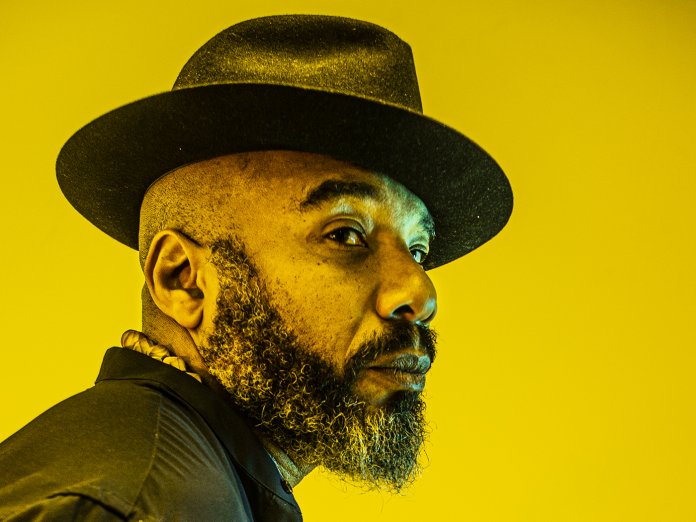Should there be any doubt about the primacy of language in Anthony Joseph’s worldview, there’s cast-iron proof of it in the epic Language (Poem For Anthony McNeill), from his fourth solo album. In what’s essentially a secular riff on the beginning of John’s Gospel, he declares, “It is language which calls all things to creation and language is the origin of the world/The word was a great mass of a black star exploding…”
- ORDER NOW: The August 2021 issue of Uncut
Joseph’s words, meanwhile, don’t so much explode on The Rich Are Only Defeated… as illuminate, recollect, bear witness, question and – crucially – enthral; his poems are energetic yet nuanced flows of richly imaginative language in masterful control, not flashy displays. A Trinidadian who moved to London in 1989, Joseph has made the written and spoken word his life’s work on multiple fronts. He’s released three studio albums with The Spasm Band (whose players included Shabaka Hutchings and Keziah Jones), the first being 2007’s Leggo De Lion. It set Joseph’s recitations of lyrics from his novel The African Origins Of UFOs against a backdrop of jazz, Afrobeat and stripped-down, heavily percussive funk. He’s also recorded three solo albums, published numerous works of poetry and prose and currently teaches creative and life writing at De Montfort University. If one UK figure is currently the ne plus ultra of experimental writing and spoken-word performance rooted in Caribbean identity, it’s surely Joseph.
His new record takes its title from The Black Jacobins, a book by Trinidadian historian CLR James published in 1938. It tells the story of Toussaint L’Ouverture, who led enslaved black labourers to victory in the Haitian Revolution. But it’s in no way a concept album – in the mix are personal reminiscences, homages to Joseph’s Caribbean literary progenitors (Sam Selvon, Anthony McNeill, Kamau Brathwaite) and particular narratives that carry universal truths. Nor is it strictly solo: Joseph is backed by a cast of musicians that includes woodwind players Denys Baptiste, Hutchings, Colin Webster and Jason Yarde (who also produces) and French pianist/organist Florian Pellissier. Joseph told Uncut he was initially aiming for more of a “spiritual jazz vibration” than on his two previous LPs but that Covid and the murder of George Floyd saw the sound become infused with “a more righteous rage”.
That rage, though set on a languid simmer, is evident on Calling England Home, where Joseph relates personal immigrant experiences that echo those of so many before him: “I worked in the basement/But I soon learned to tie my apron in a way that retained some dignity/And in my first summer above the corner shop I listened to rare groove on pirate radio/I was flung so far from any notion of nation/How long do you have to live in a place before you can call it ‘Home’?” And righteous anger certainly ripples through Swing Praxis, a taut, metatextual jam that has Joseph calling on his people to harden their resolve in the struggle for equality and justice (“Either we vote or protest or tremble or march or fight”) and extolling the power of swing “as method, as action, as rubric, as heritage, as a black and combative orchestra with terrible bees and whistles and teeth”. All this to a thrilling mix of cool and hot jazz, where the urgent honking of multiple saxophones, in both celebration and protest, whips up a raucous finale.
Joseph may be part of a broad fellowship that includes Gil Scott-Heron, whose vocal tone and socio-political focus he recalls, but his speech rhythms and vernacular mark him out. He’s cited the hymns of his grandparents’ Baptist church, calypso and the magical nature of the Trinidad carnival as influences and describes himself as “essentially a Caribbean surrealist poet”. This is most striking in Maka Dimweh, which tells of a Guyanese soldier dispatched to clean up after the Jim Jones horror show: Joseph taps Trinidadian English Creole, his flow like a riptide before it gives way to a woodwind squall, with some tense guitar work. The dazzling Language (Poem For Anthony McNeill) follows, waves of tumultuous improv heaving and crashing around Joseph’s marvelling, as he considers a firefly’s tail and various kinds of soil, that “we have names for everything now”.
If naming is a kind of creation, then The Rich Are Only Defeated… conjures a singular universe. Its idiosyncratic educational power is just one of its attributes; overwhelmingly, it’s the sound of Joseph reveling in the power of language and the possibilities of poetry and music in concert.



